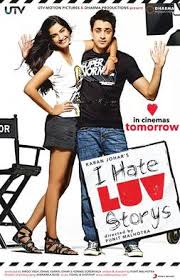Some romantic comedies embrace clichés, and others flip them on their head—this one attempts both. Released in 2010, this charming Bollywood rom-com stars Imran Khan and Sonam Kapoor, set against the backdrop of contemporary Mumbai and the film industry itself. As its title suggests, it navigates the tropes of romance, love, and Bollywood melodrama, positioning itself in a space between homage and satire. At its heart, the film is a playful exploration of love stories in a genre that thrives on sentimentality, with a self-aware narrative that pokes fun at itself.
The story centers around Jay, a cynical assistant director played by Imran, who believes love is nothing more than a construct fabricated by Bollywood. On the opposite end of the spectrum is Simran, played by Sonam, a die-hard romantic who believes in the magic of love. As fate would have it, they are forced to work together on a love story, despite their opposing views on romance. While Jay mocks the very concept of love, Simran finds herself caught between her real-life engagement to her perfect fiancé, Raj, and her growing feelings for the non-believer. Their dynamic creates a narrative tension that oscillates between banter and emotional depth, but like all good rom-coms, it keeps you guessing about the resolution of their love-hate relationship.
The acting is one of the film’s most endearing qualities. Imran brings a laid-back charm to Jay’s character, perfectly embodying the anti-hero who refuses to believe in love but still manages to make the audience root for him. His comedic timing, particularly in scenes where he mocks Bollywood’s traditional love story tropes, is spot-on. Whether it’s rolling his eyes during a cheesy romantic scene or delivering sarcastic one-liners, Imran plays Jay with a balance of humor and heart. Sonam, on the other hand, brings warmth and sincerity to Simran, playing her as the quintessential idealistic girl-next-door who is blinded by the idea of perfect love. The chemistry between the two leads is effortless, their banter sharp, making their evolving relationship believable, even though their characters initially feel like polar opposites. Their performances ground the film, especially during its more whimsical moments.
One of the standout aspects of the movie is its self-referential direction. Punit Malhotra, in his directorial debut, doesn’t just tell a love story; he comments on it. The film plays with Bollywood’s romantic tropes, often making fun of the clichés it eventually embraces. From running through fields of flowers to dramatic misunderstandings, the movie is filled with moments where it both mocks and indulges in the very conventions it critiques. This meta-narrative is refreshing, especially for an audience familiar with the overly sentimental love stories that Bollywood is famous for. Punit’s direction makes sure the film feels light and breezy, but with a wink and a nod toward the absurdity of love as portrayed in cinema.
Visually, the movie delivers with bright, vibrant cinematography that captures the glittering world of Bollywood and its larger-than-life sets. The scenes set on movie sets are particularly striking, with the film within a film concept creating some visually interesting parallels between Jay and Simran’s reality and the fictional love story they are working on. The cinematography is playful, mirroring the lighthearted tone of the script. There’s a distinct flair in the way Mumbai is captured too—a blend of the glamorous and the mundane, reflecting the contrasting lives of Jay and Simran.
The music, composed by Vishal-Shekhar, is a highlight. The soundtrack is catchy and fits seamlessly into the narrative, from the peppy “Bin Tere” to the playful title track “I Hate Luv Storys.” The songs effectively capture the emotions of the characters without feeling forced. The background score complements the overall playful tone of the movie, providing a perfect backdrop for the film’s romantic escapades and comedic beats. The integration of music and scenes, especially the dreamlike sequences, help elevate the cinematic experience, blending traditional Bollywood musical elements with a modern touch.
Despite its strengths, the film isn’t without its flaws. The plot, while engaging, can feel formulaic at times. Though the self-referential humor works for the most part, the film ultimately conforms to the same clichés it pokes fun at. As much as it tries to be a parody of Bollywood love stories, it still falls into the trap of predictability, particularly in its third act. The narrative becomes somewhat contrived as it nears the resolution, leaning heavily on familiar tropes like love triangles and grand gestures, which undermines the film’s initial promise of being a fresh take on romance.
The editing could have been tighter, especially in the second half, where the pace starts to drag as the film gets bogged down in melodrama. While the first half is crisp, focusing on character development and humor, the latter half meanders a bit before reaching its inevitable conclusion. The transitions between humor and emotional depth are not always smooth, and the film sometimes struggles to find the right balance between satire and sincerity.
The costume design is noteworthy, particularly in how it reflects the personalities of the characters. Jay’s casual, understated wardrobe mirrors his cynicism toward love, while Simran’s more vibrant, romantic attire underscores her dreamy outlook on life. The contrast in their costumes visually reinforces the opposites-attract dynamic between the leads.
In conclusion, the movie is a fun, light-hearted take on love stories that doesn’t take itself too seriously. The lead performances, especially the chemistry between Imran and Sonam, make the film enjoyable to watch, even during its predictable moments. Punit’s self-aware direction adds a layer of humor and freshness to what could have been a run-of-the-mill romantic comedy. While it doesn’t entirely break away from the conventions it critiques, it’s a film that will appeal to both fans of Bollywood romances and those tired of the genre’s overused tropes. If you’re in the mood for a feel-good film that playfully critiques the genre it belongs to, this one is a solid pick. Just don’t expect it to completely rewrite the rules of romance.







